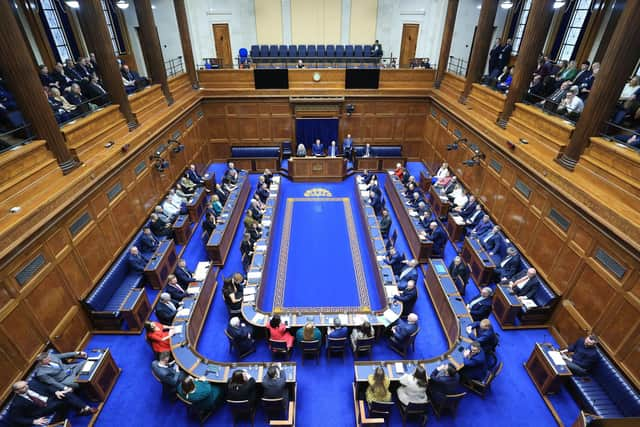David Brooks: Stormont Brake can work to protect Northern Ireland from harmful EU law


Given that there is a massive amount of retained EU law across all of the UK, we never set out to remove all EU law in our province (that is a myth peddled by our opponents).
We are in the business of ensuring that in return for retaining privileged access to NI’s £8bn export market in the EU, local elected representatives are given a genuine stake in deciding whether new and amended laws should apply here.
Advertisement
Hide AdAdvertisement
Hide AdAs a result of our stance, real progress has been achieved. Through our action in bringing the EU and UK back to the negotiating table, legal change to Article 13 of the NI Protocol was agreed which ends the automatic pipeline of new or amended EU law, handing MLAs a direct say in whether harmful rules should be vetoed by the government.


We have ended the automatic application of new or amended EU law that was imposed on NI without any democratic input under the protocol.
Indeed, the very fact that some of our unionist detractors are speaking of divergence from EU law if the Stormont Brake is applied, proves that it can work in protecting NI from EU law that would be harmful to our place in the Union.
Furthermore, even if there were the risk of the application of the brake resulting in some divergence from GB, this has nil effect on our ability to trade within the UK Internal Market, either east-west or west-east and the principle of mutual recognition of NI and GB goods has now been passed into law by Parliament. Our ability to sell our goods in the UK Internal market is now guaranteed in law for the future and in all circumstances.
Advertisement
Hide AdAdvertisement
Hide AdThe Stormont Brake has always had its detractors, principally because of what they think it ought to do, rather than what it does, but with the new commitments made by the UK government in the Command Paper, we believe it can work and must be tested.
Our detractors rubbish it because - at least partly - it relies on the government being under a legal duty to act on our concerns.
However, those same detractors apparently see no contradiction in separately arguing that we should permanently boycott the devolved institutions, cede to Westminster all control and any say for ourselves and simply wait on a Labour government riding over the hill to save us. That is not a strategy that advances our cause. Indeed, such direct rule will not result in a single EU law being blocked or disapplied in Northern Ireland.
There are those who take an ‘all-or-nothing’ approach to these issues and to the removal of all EU law, but that was never the intended purpose of the brake. Crucially, they know that and they should be honest about it.
Advertisement
Hide AdAdvertisement
Hide AdOf course those who disagree with the Stormont Brake do so for very different reasons. On one hand, there are some who feel it does not go far enough to restore the democratic deficit, and on the flipside other parties feel it will jeopardise future access to the EU market.
What has united both camps, however, is the willingness to wheel out the concept of “trivergence” as a scare tactic to advance their narrow agendas. Such scaremongering fails to reflect the reality of what these arrangements mean and the protections they afford to NI and our place in the UK Internal Market.
With new and additional legal safeguards passed by Parliament in the last fortnight, ultimately for hypothetical "trivergence” to be a threat because of the Stormont Brake, GB would have to opt to move away from the existing law that applies in NI - either before or after it is pulled. I believe this is unlikely to happen for a number of reasons.
Firstly, the DUP has secured a new safeguard in law against divergence on the GB side which will ensure that any future legislation and regulatory measures are screened and assessed for any adverse impacts on trade within the UK internal market and that appropriate action is taken to ameliorate any such impact.
Advertisement
Hide AdAdvertisement
Hide AdSecondly, if the brake is pulled at the request of MLAs, and the government permanently vetoes a particular law in the absence of cross-community consent in the Assembly, they will already have accepted the case that the EU law in question would create new, significant and lasting trade barriers between GB and NI. More than that, they will also have accepted the pain of any remedial action the EU might take. Why, then, is it conceivable that the government would at that point choose to leave NI in limbo rather than exert its parliamentary sovereignty and legislate to ensure the rules in NI keep pace with the rest of the UK going forward? Indeed, it is also open to the assembly itself to so legislate.
In truth, concerns about a so-called ‘grey area’ have been exaggerated and cynically hyped up to undermine the credibility of the brake before it has even been triggered.
Jim Allister has predictably jumped on this bandwagon but in truth it is he who faces being left in limbo. The TUV has suggested that the Stormont Brake is a ‘‘clever device to induce the retention of all evolving EU law’’. Whilst this is of course nonsense, does that mean Jim is categorically ruling out joining DUP MLAs in signing a petition seeking to prevent future EU laws from applying in Northern Ireland?
If the new democratic safeguards we have secured are so inadequate, will Jim refuse to use them? Will he boycott future assembly votes on whether new EU laws that are harmful to the UK internal market should be applied here? The unionist electorate deserve answers to these questions.
David Brooks is a DUP MLA for East Belfast and vice chair of the assembly democratic scrutiny committee